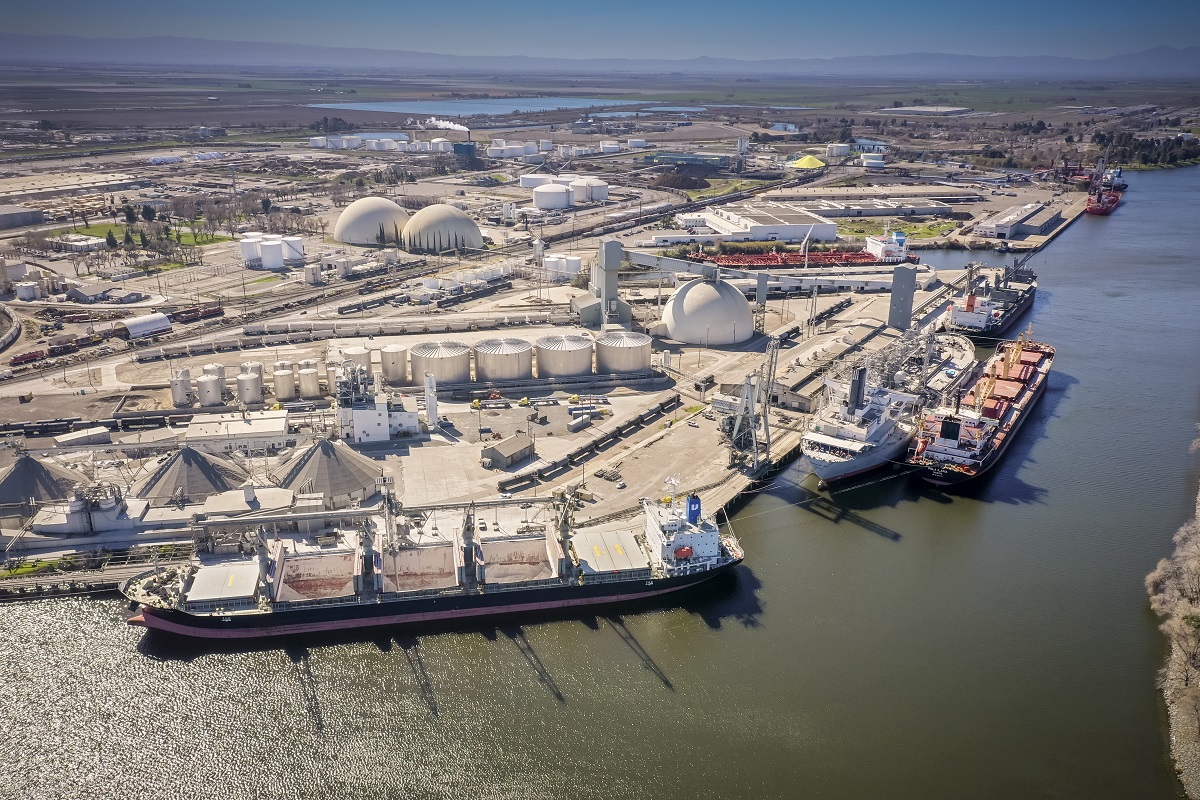
Community Fuels is owned by American Biodiesel Inc. and manufactured biodiesel fuel on property leased from the Port of Stockton. The investigation involved the EPA’s Criminal Investigation Division, San Joaquin County District Attorney, City of Stockton Municipal Utilities Department, Port of Stockton, and California Department of Toxic Substances Control. (photo by Port of Stockton)
Christopher Young, 45, of El Dorado Hills, was sentenced today by U.S. District Judge Kimberly J. Mueller to 18 months in prison and a $50,000 fine for tampering with monitoring equipment, unlawful discharge of industrial wastewater, and conspiracy, Acting U.S. Attorney Phillip A. Talbert announced.
Young was Director of Operations for Community Fuels from 2010 to 2016. Community Fuels is registered in San Joaquin County by American Biodiesel Inc. and manufactured biodiesel fuel on property leased from the Port of Stockton
According to court documents, Young participated in a scheme to discharge hundreds of thousands of gallons of polluted wastewater by various unlawful means, including the discharge of wastewater directly into Stockton’s sewer system after tampering with pH sensors and discharge flow monitors to hide evidence of the dumping. Young also directed others to cause a discharge on various dates using improvised hidden hoses and pipes that ultimately connected to the city’s sewer system.
The City of Stockton issued wastewater permits to American Biodiesel that allowed the limited discharge of wastewater into the sewer system under specific standards—a limitation on the total volume discharged per month, an allowable range of pH readings, and a restriction on the concentration of methanol. American Biodiesel had previously represented to the City of Stockton that unpermitted wastewater would be transported offsite to an appropriate facility for treatment. Young’s actions circumvented these restrictions through equipment tampering and unauthorized dumping.
In one instance in 2016, the City of Stockton conducted a surprise inspection and found plant personnel engaged in a procedure that misreported the pH level data and the flow rate of wastewater being discharged into the Stockton sewer system. The City issued an immediate cease and desist order. Young then met with the city inspectors and told them that the discharge was an accident and employees had been disciplined for the act. But later, Young sent an email instructing an employee to restart the wastewater dumping into the sewer because inspectors were unlikely to appear after hours.
“Violating the environmental laws of the United States can carry criminal consequences, potentially including time in prison,” said Acting U.S. Attorney Talbert. “Protecting the environment for our community and future generations is critical, and those who violate our environmental laws will be held accountable.”
“Our nation’s environmental laws are designed to protect our communities, natural resources, and critical infrastructure from hazardous pollutants,” said Special Agent in Charge Scot Adair of EPA’s criminal investigation program in California. “The sentencing outcomes in this case demonstrate that companies and individuals that intentionally violate those laws will be held responsible for their crimes.”
On July 8, 2019, Judge Mueller sentenced American Biodiesel for violations of the Clean Water Act when it allowed the discharge of industrial wastewater into the City of Stockton sewer system. American Biodiesel admitted to tampering with monitoring devices and methods designed to detect such violations, and admitted that employees tampered with pH recordings and flow meters for the purpose of underreporting acid and pollutant levels and volumes that would have exceeded the figures allowed under the city’s regulations.
This case was the product of an investigation by the EPA’s Criminal Investigation Division, the San Joaquin County District Attorney’s Office, the City of Stockton Municipal Utilities Department, the San Joaquin County Environmental Health Department, the Port of Stockton, and the California Department of Toxic Substances Control. Assistant U.S. Attorneys Philip A. Scarborough and Paul Hemesath prosecuted the case.